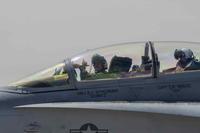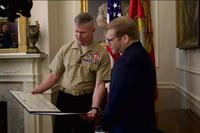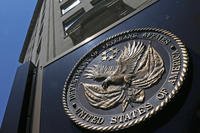Defense Secretary Ashton Carter was in Israel on Monday for the arrival of the first two F-35 Joint Strike Fighters meant to enhance the first-strike "in depth" capabilities of the Israeli Defense Forces in the region.
The arrival of the stealthy F-35s was delayed for several hours because of weather and came a day after Israeli Prime Minister Benjamin Netanyahu said that he would lobby President-elect Donald Trump to scrap the nuclear deal with Iran and provide him with several "options" for dealing with the aftermath. He declined in a CBS "60 Minutes" interview to say what the options were.
The two F-35s flying the last leg from a U.S. base in Italy were the first of about 50 that will be supplied to Israel to replace its existing fleet of F-16s.
"The future is here" to ensure Israeli air superiority over potential enemies for years to come, Israeli Air Force Chief of Staff Brig. Gen. Tal Kalman said, according to the Jerusalem Post.
The F-35s "will allow the air force to do missions that its current aircraft are unable to do today" and "in quantity and quality, depth into enemy territory, in threat-filled areas, in the amount of missions, with less manpower in comparison with today," Kalman said.
"We are going to be very strong for a long time, having these airplanes, and Israel has to be strong in this region for its existence," said Col. Asaf, who could be identified only by his first name. "It's a message for everybody that Israel will keep on holding the high-end technology in this area."
The Israeli air force F-35s will be called "Adirs," meaning "noble," "strong," or "mighty" in Hebrew.
A top executive for F-35 prime contractor Lockheed Martin Corp., which has been criticized in recent days by Trump for the massive cost overruns on the aircraft, was on hand at Israel's Nevatim air base in the Negev desert for the delivery.
"It's exciting to bring this airplane and its capabilities to the country," said Bill Phelps, Lockheed's executive vice president and general manager of the F-35 program. "We welcome the opportunity to address any questions the president-elect has about the program."
Phelps said that Lockheed is working to reduce the $100 million-plus per unit cost of the F-35s. "We project the price of the aircraft will be $85 million in the 2019-2020 time frame," he said in a statement. At a total of more than $400 billion and running, the F-35 program is the most expensive weapons system ever undertaken by the Pentagon.
Netanyahu and Defense Minister Avigdor Lieberman joined Carter to welcome the F-35s. Speaking shortly before the arrival of the aircraft, Netanyahu thanked Carter and President Barack Obama for "this commitment to the alliance with Israel."
Without mentioning Iran, Netanyahu also issued a warning to Israel's enemies: "I want to also say clearly, anyone who thinks to attack us will be attacked, anyone who thinks to destroy us is positioning themselves to an existential threat" from Israel.
Netanyahu did not elaborate on the "existential threat" Israel posed to enemies. The long-standing policy of Israel has been neither to confirm nor deny that it has a nuclear arsenal.
Carter said the U.S. "is more committed to Israeli security than ever before," and the F-35s provide evidence. "From its stealth technology to its fighter capabilities, the F-35 will allow pilots to evade detection and fly at supersonic speeds while conducting air defense; intelligence, surveillance, and reconnaissance; or ground attack missions," Carter said.
The U.S. Air Mobility Command at Scott Air Force Base in Illinois said that Air National Guard KC-135 Stratotanker refueling tankers enabled the delivery of the first two F-35s to Israel.
The 618th Air Operations Center, based out of Scott, assigned the Tennessee Air National Guard's 134th Air Refueling Wing, New Hampshire ANG's 157th ARW and Pennsylvania ANG's 171st ARW the mission of providing critical aerial refueling support en route to Israel, Air Mobility Command said in a statement.
"We always need to be at the top of our game," said Maj. John Hale, aircraft commander for the Tennessee ANG KC-135. "That's especially the case when enabling the delivery of Israel's first fifth-generation fighters with a 52-year-old aircraft [KC-135]."
In the "60 Minutes" interview, Netanyahu denied any personal animosity toward Obama despite his address to Congress last year condemning the negotiations on the deal to rein in Iran's nuclear programs, called the Joint Comprehensive Plan of Action, with the backing of Russia, China and the European Union.
In a break with protocol, Netanyahu spoke to Congress not by invitation of the White House or the State Department, but by Republicans in Congress. Netanyahu also clashed frequently with Obama and Secretary of State John Kerry on the expansion of Jewish settlements in Palestinian areas of the West Bank.
Referring to his relationship with Obama, Netanyahu said, "I think that suppose we had the greatest of personal chemistry, OK? So what. You think I wouldn't stand up against the Iran deal if I thought, as I did, that it endangers the existence of Israel? Of course I would."
In contrast, Netanyahu said he has a strong relationship with Trump. "I know him very well, and I think his attitude, his support for Israel is clear. He feels very warmly about the Jewish state, about the Jewish people. There's no question about that."
During the campaign, Trump called the nuclear deal with Iran a "disaster," but his nominee for defense secretary, retired Marine Gen. James Mattis, is on record as saying that the U.S. cannot walk away from the nuclear deal with Iran unless there is a clear violation.
Last month in Vienna, Reza Najafi, the Iranian ambassador to the International Atomic Energy Agency, complained that Israel has a nuclear arsenal that threatens peace in the Mideast and accused the West of a "double standard" in singling out Iran's nuclear programs.
"The Zionist regime has regrettably continued to advance its nuclear and military program in recent years through disregard of the legitimate demand of the international community, the West's blind support and the blatant violation of all international rules and regulations," Najafi said.









